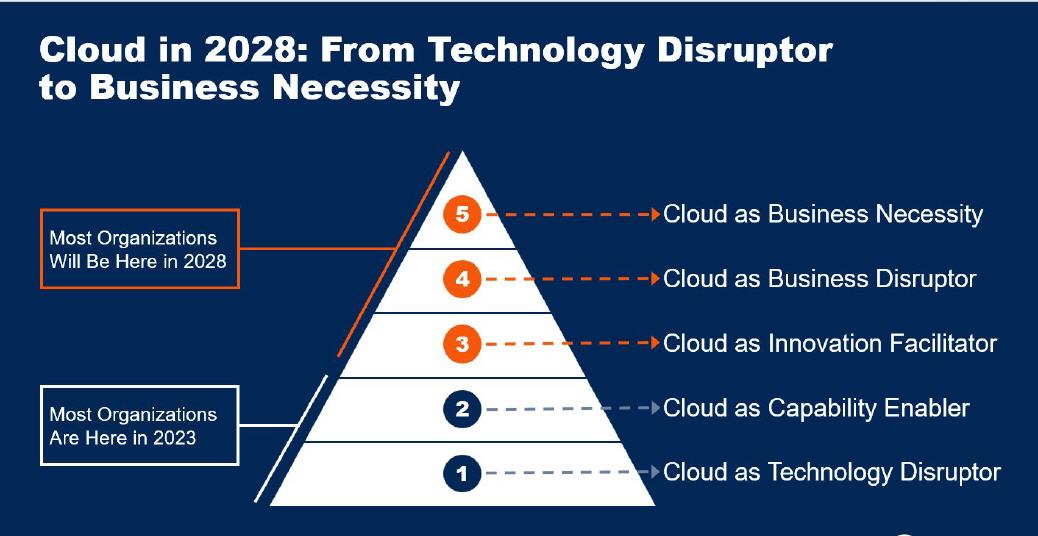
Technische Vorteile der Cloud nutzen
Gartner-Prognose: Die Cloud wird bis 2028 zu einer Geschäftsnotwendigkeit
Die globalen Ausgaben für Public-Cloud-Dienste werden sich 2024 auf 679 Milliarden Dollar belaufen
Laut Gartner wird sich Cloud Computing bis 2028 von einem technologischen Störfaktor zu einer notwendigen Komponente für die Aufrechterhaltung der Wettbewerbsfähigkeit von Unternehmen entwickeln. Die IT-Ausgaben für Public-Cloud-Dienste steigen ungebremst weiter an. Im Jahr 2024 werden sich die weltweiten Endnutzerausgaben für Public-Cloud-Dienste voraussichtlich auf 679 Milliarden US-Dollar belaufen. 2027 werden sie voraussichtlich 1 Billion US-Dollar überschreiten.
"Unternehmen investieren aktiv in Cloud-Technologien, da diese das Potenzial haben, Innovationen zu fördern, den Markt zu verändern und die Kundenbindung zu verbessern, um sich dadurch einen Wettbewerbsvorteil zu verschaffen", sagt Milind Govekar, Distinguished VP Analyst bei Gartner. "Während viele Unternehmen begonnen haben, die technischen Vorteile der Cloud zu nutzen, haben nur wenige ihr volles Potenzial zur Unterstützung der geschäftlichen Transformation ausgeschöpft. Infolgedessen nutzen Unternehmen die Cloud, um eine neue, von künstlicher Intelligenz (KI) angetriebene Disruptionswelle auszulösen, die es ihnen ermöglicht, Geschäftswerte in großem Umfang zu erschließen."
Gartner Says Cloud Will Become a Business Necessity by 2028
Global Public Cloud Services Spending to Total $679 Billion in 2024
(12.06.24) – By 2028, cloud computing will shift from being a technology disruptor to becoming a necessary component for maintaining business competitiveness, according to Gartner, Inc. IT spending on public cloud services continues to rise unabated. In 2024, worldwide end-user spending on public cloud services is forecast to total $679 billion and projected to exceed $1 trillion in 2027.
"Organisations are actively investing in cloud technology due to its potential to foster innovation, create market disruptions, and enhance customer retention in order to gain a competitive edge,” said Milind Govekar, Distinguished VP Analyst at Gartner. "While many organisations have started to seize the technical advantages of cloud, only a few have unlocked its full potential in supporting business transformation. As a result, organisations are using the cloud to launch a new wave of disruption driven by artificial intelligence (AI), enabling them to unlock business value at scale.”
The Role of Cloud in 2023
Most companies currently consider the cloud as a technology platform. In 2023, organisations are using cloud computing either as a technology disruptor or capability enabler. Gartner predicts that more than 50% of companies will use industry cloud platforms by 2028 to accelerate their business initiatives. In 2028, most organisations will be leveraging cloud as a business necessity (see Figure 1).
Organisations that are utilising the cloud as a technology disruptor are harnessing its transformative potential to revolutionise non-cloud, data-centre oriented computing styles and technologies. "As businesses navigate through digital transformation journeys, movement to the cloud becomes a key decision point," said Govekar. Companies that are adopting cloud technology as a capability enabler are using its potential to enable new capabilities such as elasticity, rapid continuous integration/cloud delivery (CI/CD), serverless functions and AI-infused APIs and processes that were difficult to achieve pre-cloud. To exploit these new capabilities, organisations must carefully evaluate factors such as their investment in skills development, breaking down operational silos, and promoting collaboration among teams to seamlessly adopt automation.
Cloud as a Business Necessity in 2028
Over the next few years, cloud computing will continue to evolve from being an innovation facilitator to a business disruptor and, ultimately, a business necessity.
With cloud computing as an innovation facilitator, organisations can distribute platform business concepts widely by using its underlying platform technology to provide interconnections, scale, aggregation and analysis capabilities, which allows the use of technology as a fundamental component of a business model.
"By leveraging the ecosystem of cloud providers, organisations can introduce innovative products and services, such as fraud prevention solutions for second-hand cars from tire manufacturers, or rapid vaccine development through cloud-based machine learning by pharmaceutical companies,” said Govekar.
By 2028, most organisations will fully transform into digital entities capable of sensing and responding to business and market conditions. "With cloud computing becoming an integral part of business operations in 2028, CIOs and IT leaders will have to implement a highly efficient cloud operating model in order to achieve their desired business objectives,” said Govekar. (Gartner: ra)
eingetragen: 06.12.23
Newsletterlauf: 12.02.24
Gartner: Kontakt und Steckbrief

Der Informationsanbieter hat seinen Kontakt leider noch nicht freigeschaltet.
